- Home
- James L. Swanson
Chasing Lincoln's Killer Page 2
Chasing Lincoln's Killer Read online
Page 2
Dr. Charles A. Leale, a twenty-three-year-old U.S. Army surgeon, was on duty at the Armory Square Hospital in Washington when he heard that President Lincoln and General Grant would be at the performance that night. He decided to attend. Leale wanted, most of all, to catch a glimpse of the famous general who had won the Civil War.
Booth rode over to the Kirkwood House, where he accomplished his strangest errand of the day. The Kirkwood was the residence of the new vice president, Andrew Johnson, who was from Tennessee. The job did not include official quarters, so he lived at a hotel. Johnson’s room was unguarded and, if Booth had wanted to, he could have walked upstairs and knocked on the door, or worse. But he did not want to see or harm the vice president. He just wanted to leave him a note. Booth approached the front desk, wrote a brief note, and handed it to the desk clerk, who placed it in Johnson’s mail slot. The message read: “Don’t wish to disturb you. Are you at home? J. Wilkes Booth.”
Next, Booth visited a boardinghouse on H Street, a few blocks from Ford’s Theatre, to pay what looked like an innocent social call on the owner. Mary Surratt was a forty-two-year-old Maryland widow and mother of John Harrison Surratt, a Confederate secret agent and friend of Booth’s. Over the last several months, Booth had become a frequent caller at Mrs. Surratt’s Washington townhouse. Tonight her son, John, was not home — he was out of the city on rebel business. Mary told Booth that she was riding out that afternoon to her country tavern in Surrattsville, Maryland, several miles south of Washington. Booth asked if she would mind delivering a small package wrapped in newspaper to her tavern. Conveniently, Booth had the package with him.
There was one more thing. Booth told Mary that he would be riding out of Washington this evening. Sometime that night, he said, he would stop at her tavern to pick up not only this package, but also the guns, ammunition, and other supplies that her son, John, had already hidden there for him. He asked Mary to tell the tavern keeper, John Lloyd, to get everything ready for the actor’s visit this evening. She agreed, and soon she and Lewis Weichmann, one of her boarders, drove down to Surrattsville by carriage.
At some point that afternoon, Booth made the final arrangements. There were two types of preparation: practical and mental. First, the weapons. Booth chose as his primary weapon a .44 caliber, single-shot, muzzle-loading pistol manufactured by Henry Deringer of Philadelphia. It was a small, short-barreled, pocket-size handgun designed for concealment, not combat. Its big .44 caliber ball, weighing in at nearly an ounce, was a solid, deadly round.
Unlike military pistols that could fire up to six rounds before reloading, the Deringer could be fired just once. Reloading was a time-consuming process that called for two hands and more than twenty seconds. Booth knew that his first shot would be his last. If he missed, he wouldn’t have time to reload.
Booth left behind no explanation for why he chose the Deringer over a revolver. Pistols misfire occasionally. Either the copper percussion cap might fail to spark, or the black powder in the barrel might fail to ignite because of dampness. Booth was a thrill seeker, so perhaps he wanted to increase his excitement by risking the use of a one-shot pistol. Or did he believe it more heroic, more honorable — even more gentlemanly — to take his prey with a single bullet? Perhaps he preferred a stylish single-shot to blazing away with a six-shooter.
The print of Booth’s Deringer pistol
(Previous page) A confident Booth, well known for his good looks and fine clothes, in all his splendor, much like he was dressed the night he shot the president
Then, if he missed, or failed to kill the president, he would turn to his backup weapon, a Rio Grande camp knife, a handsome and extremely sharp type of bowie knife.
Before leaving the National Hotel, Booth slid the knife and pistol into his pockets and gathered the rest of his belongings. He planned to travel light that night. In addition to the weapons and his clothing — a black felt slouch hat, black wool coat, black pants, big knee-high black leather riding boots with spurs — he took only a velvet-cased compass, keys, a whistle, a date book, a pencil, some money, a small knife, and a few other small items, including small photographs of five of his favorite girlfriends.
When Mary Surratt and her boarder arrived in Surrattsville, the tavern keeper, John Lloyd, wasn’t there. He had left on an errand. Mary waited for him. When Lloyd returned, he parked his wagon, climbed down, and began unloading his cargo of fish and oysters.
Mary delivered the message to the tavern keeper John Lloyd: “I want you to have those shooting irons ready; there will be parties here tonight who will call for them.”
(Previous pages)
Mary Surratt
Mary Surratt’s Washington, D.C., boardinghouse, where the conspirators met, and where Lewis Powell and Mrs. Surratt were arrested
She handed him Booth’s package wrapped in newspaper. The evening callers will want this, too, she explained. And, she added, give them a couple of bottles of whiskey. Her mission accomplished, Mary and Lewis drove back to Washington.
Lloyd followed Mary’s instructions. He carried the package upstairs, unwrapped it, and discovered Booth’s binoculars. He went to a room where, several weeks ago, John Surratt had shown him how to hide two Spencer carbines between the walls. Lloyd retrieved them and placed them with the binoculars in his bedchamber.
At the Herndon House Hotel, around the corner from Ford’s, at around 8:00 P.M., Booth presided over a meeting of some of the conspirators he had recruited over the previous months to strike against President Lincoln. This was not the first time they had assembled to move against the president. They had failed at least once before.
Beginning in 1864, Booth, the young stage star, had pledged his cash, his celebrity, and his connections in hatching a bold plan. He put together a harebrained scheme to kidnap President Lincoln, take him to Richmond, and hold him as a hostage for the Confederacy, in an effort to help win the war for the South.
From the time of Lincoln’s election in 1860, there arose several conspiracies to kidnap or murder him. Pro-secession, pro-Southern rebels began mailing death threats to Lincoln before he took office in 1861. Some even sent him jars of poisoned fruit! In one notorious plot of 1861, local rebels schemed to assassinate the president-elect when his railroad train passed through Baltimore on the way to Washington for his first inauguration. But Detective Allan Pinkerton ruined the scheme by persuading Lincoln to pass through the city in disguise, several hours ahead of schedule. Other Lincoln haters threatened to assassinate him on the east front of the Capitol the moment he began to read his inaugural address. During the Civil War, several Southern military officers, as well as a handful of officials in the Confederate Secret Service, considered plots against Lincoln. But big talk was cheap in wartime Washington. As late as January 1865, with the Confederacy in danger of collapse at any moment, not one of the conspiracies resulted in serious action against Abraham Lincoln. At some point, John Wilkes Booth came into contact with sympathetic secret agents in Canada, New York City, Washington, D.C., Maryland, and Virginia.
In late 1864 and early 1865, Booth organized his own little band of conspirators, loyal to him and not the Confederacy. He recruited a gang who, after he clothed and fed them, paid for their food and drink, and allowed them to enjoy the benefits of his fame and favor, would, he hoped, follow him anywhere — even into a plot to kidnap the president of the United States. Booth and his gang of conspirators — Lewis Powell, David Herold, John Harrison Surratt, and George Atzerodt, as well as Samuel Arnold, Michael O’Laughlen, and others who drifted in and out of his circle — would change cheap talk to big action by kidnapping the president.
(Previous page) An 1865 photomontage of John Wilkes Booth and his alleged conspirators
On March 17, 1865, Booth and his henchmen planned, like highway robbers, to ambush Lincoln’s carriage at gunpoint on a deserted road as he rode home to the Executive Mansion. They
would make Lincoln their hostage. Booth’s information was incorrect, however, and Lincoln did not arrive as expected. Instead, unbelievably, while Booth and his gang lay in wait on the road on the outskirts of the city, Lincoln was giving a speech at Booth’s own hotel, the National!
If only the kidnapping plot had worked! There would have been no torchlight parades, no crowds serenading Lincoln at the Executive Mansion, no little children scampering through the streets with little paper flags with red, white, and blue stars and stripes.
Although his panicked gang scattered after that ridiculous failure, Booth hoped to try again. But events unfolded quickly when, eighteen days later, Richmond fell, and then General Lee surrendered.
Lincoln’s April 11 speech provoked more violent talk. The president’s proposal for a limited black citizenship and voting rights enraged the racist actor. But Booth did nothing. If he was serious about assassinating Lincoln, all he had to do was stroll over to the Executive Mansion, announce that the famous actor John Wilkes Booth wished to see the president, await his turn — which nearly always resulted in a private talk with Lincoln — and then shoot Lincoln at his desk. But that would have been a suicide mission. It would have been difficult to escape the White House.
Incredibly, presidential security was very weak in that era, even during wartime; almost anyone could walk into the Executive Mansion without being searched and request a brief meeting with the president. It was a miracle that no one had yet tried to murder Lincoln in his own office.
Booth would soon turn his anger and violent talk into action.
Now, April 14, 1865, Booth assembled enough men to accomplish another mission. “Booth proposed,” aspiring kidnapper George Atzerodt recalled, “that we should kill the president.” It would, said Booth, “be the greatest thing in the world.” Tonight, at exactly 10:00 P.M., Booth and his henchmen would throw into chaos the Union government by killing its top leaders. That would, they hoped, incite the Confederacy to continue the war against the Union. George Atzerodt, Lewis Powell, and John Wilkes Booth would strike simultaneously and murder Vice President Johnson, Secretary of State Seward, and President Lincoln.
Atzerodt’s assignment was to assassinate the vice president in his room at the Kirkwood House. “You must kill Johnson,” Booth told him. Lewis Powell would murder Secretary of State Seward. Seward was certain to be in his bed this night recovering from a serious carriage accident.
David Herold, an experienced outdoorsman, hunter, and tracker, would accompany Lewis Powell, take him to Seward’s home, and guide the assassin, unfamiliar with the capital’s streets, out of the city where he would meet up with Booth.
Booth claimed the most notorious part in the plot for himself. He would slip into Ford’s Theatre and assassinate the president during the play. Powell and Herold, Booth’s two most loyal pals, agreed to the plan. Atzerodt had doubts about his assignment. He would not do it, he said. Booth then threatened Atzerodt, implying that he might as well kill Johnson, because if he didn’t, Booth would accuse him anyway and get him hanged.
None of Booth’s conspirators knew it, but Booth had already implicated all of them! He had entrusted a sealed envelope to a friend and fellow actor, who was to see that the letter it contained was published tomorrow in the newspaper. In the letter, not only did Booth justify the triple assassination, but he signed his henchmen’s names to the document as well, sealing their fates.
Atzerodt’s reluctance to kill Johnson put the whole plot at risk. Atzerodt knew the details of the assassination plan that was unfolding. If he left that meeting and went to the police, Booth, Powell, and Herold would be finished. Guards would rush to protect those threatened in the plot, and the conspirators would be hunted down. Booth would fail in his mission.
At the Executive Mansion, the Lincolns were behind schedule. It was past 8:00 P.M., and they still had not gotten into their carriage. As the curtain rose at Ford’s, the coachman and Lincoln’s servant Charles Forbes were on top of the carriage. The Lincolns’ private afternoon carriage ride and absence from the mansion had left business unfinished, with several politicians still waiting for an audience with the president.
Earlier that afternoon, Lincoln was happy to be free of the politicians and the burdens of his office. It had been one of the happiest days of his life. At breakfast, son Robert told tales of Lee’s surrender. For once, the cabinet meeting was free of crises, battle news, and problems requiring the president’s immediate attention. Since Lee’s surrender, Lincoln had been more cheerful than at any other time during his presidency. He expected more good news about the surrender of additional Confederate armies.
He wanted to ride alone with Mary on this day. She had been emotionally upset since the death of their eleven-year-old son, Willie, in 1862.
They both took the loss hard. But Abraham Lincoln recovered, and Mary did not. “It was hard to lose the boy,” he said. He organized Willie’s funeral. Then he threw himself into his work.
Mary was at heart a kind woman, but some critics preferred to criticize her personal quirks — her expensive shopping habits, her jealous temper — rather than praise her good works for soldiers or her absolute loyalty to husband, liberty, and the Union cause.
The demands of the war had been so great that the president spent less and less time with Mary. Lincoln knew that he had to change that now that the war was ending. He wanted to talk to Mary about their future. He walked her to the open carriage, his good mood impossible to miss. Mary Todd Lincoln had noticed his recent optimism and now, during their afternoon carriage ride, she spoke to him about it. “Dear husband, you almost startle me by your great cheerfulness.”
Lincoln replied, “We must both be more cheerful in the future — between the war and the loss of our darling Willie — we have both been very miserable.”
During their leisurely ride, the president told his wife that they must try to be happy again. That he would like to see the Pacific Ocean. That perhaps at the end of his second term in office, they would move to Chicago and he would practice law again. Freed from the troubles of war and death — he would send no more armies of young men to die — Lincoln dreamed of the future. Mary later remembered, “I never saw him so supremely cheerful — his manner was even playful.”
That evening, when the Lincolns finally left the White House for Ford’s, they picked up their guests. General Grant and his wife had declined Lincoln’s invitation and boarded a train headed home instead. Several other couples had also declined the invitation, but Major Rathbone, an army officer, and his fiancée, Clara Harris, accepted.
At 8:00 P.M., the management at Ford’s decided not to hold the curtain for the presidential party, and the play began without them. Soon, an employee acting as lookout at Ford’s spotted the big black carriage turning down Tenth Street. It slowed to a stop beside the wood platform in front of the theater, constructed especially to assist carriage riders in getting out of their vehicles and avoiding the muddy street. The Lincolns, Henry Rathbone, and Clara Harris exited the carriage. The chief usher escorted them through the lobby, up the winding staircase, and across the first balcony to their theater box. Abraham Lincoln’s entry to Ford’s Theatre at 8:30 P.M. on April 14, 1865, was majestic and simple. He arrived with no crowd of guards or staff, and no announcement to the audience.
Before the presidential party reached the box, the actors, musicians, and theatergoers became aware of the Lincolns’ arrival. The actors onstage stopped performing. To the delight of the crowd, the conductor led his orchestra in “Hail to the Chief,” the traditional musical accompaniment to the entrance of the president.
Dr. Charles Leale, seated in the front of the first balcony, about forty feet from the president’s box, had arrived in time to witness it all. He watched the audience rise to its feet in enthusiasm and cheer. He looked around, too, and watched as Lincoln “looked upon the people he loved and acknowledge
d [them] . . . with a solemn bow.”
At this supreme moment, the people cheered the man who, after a shaky start in office, learned how to command armies, brought down slavery, and become a most eloquent and moving speaker. And as he promised he would, he had saved the Union. Lincoln stood in the box and bowed to the audience.
The outpouring of emotion from the audience and orchestra, the hissing gaslights, the packed house, the fresh, moist scent of spring in the air, the recent and happy news from the army — all combined to make a magical moment.
Ford’s Theatre, site of Abraham Lincoln’s assassination
Legend has it that John Wilkes Booth was hiding outside in the shadows near the front door of Ford’s as the presidential carriage rocked down the dirt street and slowed. Wherever he was, it is almost certain that he somehow watched with his own eyes to be certain that the Lincolns were actually inside the theater. And he probably wondered whether other guests in the box were the type who would pose a threat to his plans. It didn’t matter, really; no one was going to stop him from going through with it.
It was now about 9:00 P.M. Time for Booth to go inside the theater for the first time since the Lincolns had arrived. Although the actor had entered the theater after the performance had started, he was still on schedule. The play was like a clock, every word spoken was another tick of the second hand. After hearing some familiar dialogue, Booth would know, to the minute, how much time remained in the performance. He knew that he had at least another hour. He left Ford’s.
In a little while, he returned to his alley stable where he had left his rented horse, a bay mare. He led the horse down the alley by the reins to the back door of Ford’s Theatre. He asked theater employee Edman Spangler to hold his horse for him. Spangler said he was too busy moving scenery. Another theater employee, named John Peanut for the snack he sold to theater patrons, held the reins of Booth’s restless horse while the actor went inside.

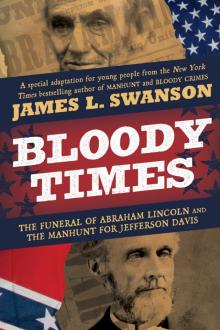 Bloody Times: The Funeral of Abraham Lincoln and the Manhunt for Jefferson Davis
Bloody Times: The Funeral of Abraham Lincoln and the Manhunt for Jefferson Davis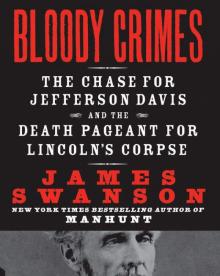 Bloody Crimes: The Funeral of Abraham Lincoln and the Chase for Jefferson Davis
Bloody Crimes: The Funeral of Abraham Lincoln and the Chase for Jefferson Davis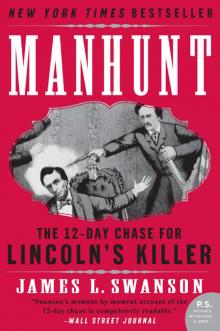 Manhunt: The 12-Day Chase for Lincoln's Killer
Manhunt: The 12-Day Chase for Lincoln's Killer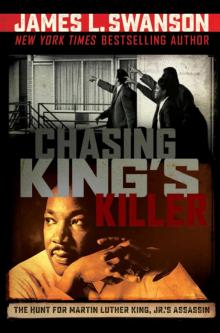 Chasing King's Killer: The Hunt for Martin Luther King, Jr.'s Assassin
Chasing King's Killer: The Hunt for Martin Luther King, Jr.'s Assassin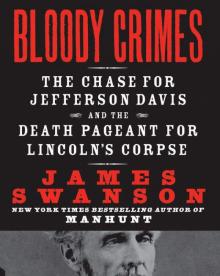 Bloody Crimes
Bloody Crimes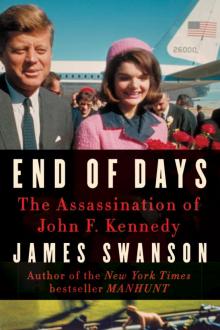 End of Days
End of Days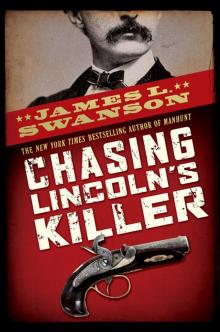 Chasing Lincoln's Killer
Chasing Lincoln's Killer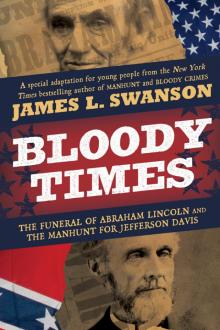 Bloody Times
Bloody Times Manhunt
Manhunt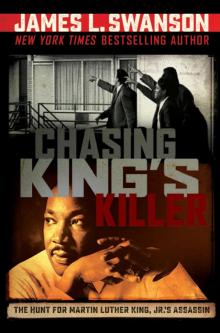 Chasing King's Killer
Chasing King's Killer